Still ready for a close-up
Hanging on to relevance: Lessons I’m learning in my late-Norma-Desmond period.
Sunset Boulevard, 1950
I used to be “big” (or, at least I thought I was; “big” being entirely relative, of course, and me being entirely delusional). When I was about 28, when the world was still all long lunches and lavish, I was appointed to what I thought (then) was my dream job – editor of the food section of The Age newspaper in Melbourne, “Epicure” as it was called (a godawful name, an elitist historical artefact even then, the turn of the century, when newspapers still inserted multiple daily “sections” focusing on specific topics, from travel to television – remember them!?).
I was young, slim, unwrinkled, ungreyed. I had expensive shoes and an Armani suit. The world felt mine, I felt big, important, enormously relevant. Lunches, cocktail parties, launches, champagne, dinners, restaurants, bars, things I mistakenly thought mattered, intoxicated by it all, thinking it was me all the invitations were about, me they wanted, rather than the column inches I controlled and the eyeballs to which I had access. I must have been insufferably self-important. Urgh. Embarrassing now to look back on.
My crash, when it came, was big too. I made that rookie error – I let my identity become completely tied up with the role. I thought I was my job. A forced sideways/backwards shift in roles and some very nasty office politics crushed me. (I am sure I’m not the only one to have experienced this … anyone else?) For a while after the crash I fell apart. It wasn’t pretty. (Picture this: an incapacity to work, a lengthy retreat with my parents, chain-smoking, an inexplicable new addiction to gory Patricia Cornwell novels, the only thing that calmed my anxiety and took my mind off my tumble.)
In the years that followed I had a couple of other big-ish jobs and titles (“big” only in my mind, my small world, that is) but never again did I make the mistake of so mixing up my identity and my job – at least not to the extent I did when I was in that first editor’s role. And, in 2017, I actually volunteered to leave the identity (and some small status) I’d carved out as a staff features writer at Australia’s prestigious Good Weekend magazine to focus on writing my book, Fake.
If I’d entertained the thought that when the book came out I might be a bit “big” again, my first writer’s festival as an author (hello Canberra!) disabused me of the notion. At the launch cocktail party in a hotel lobby, while established authors air-kissed and gushed around me, I was an awkward wallflower, no one had ever heard of me; I returned to my room, chastened, for a solo night and a movie. The overbearing and ungenerous fellow panellist who talked over me each time I attempted a remark at a session the next day and the dainty queue at the book signing confirmed how small I was.
In the years since, I thought I had made peace with smallness. I thought that, as long as I could continue to earn a living as a freelance writer, as long as editors continued to approach me to write for them, I would have sufficient relevance to sustain me.
But this year has jolted me. For the first time since I started freelancing, the steady pipeline of assignments I’ve always had come my way is drying up, relevance deprivation syndrome creeps close. I sense a fundamental shift in the world – economic factors maybe, but without question accelerated by the tailwinds of AI, its improved functionality and increasingly widespread uptake. I feel we’re at a tipping point; I feel that this year has been a death blow for traditional media, for writers, for creators, for words written by humans, for my work.
I think I’ve arrived in my late-Norma-Desmond period.
But worrying about whether I’m relevant or not is starting to look like a luxury. My mortgage doesn’t give two hoots about relevance, about how big or small I might be. Pulling beers? Aged care work? Waiting tables? Any one of those is on the cards now.
Fresh reminders of my uncomfortable situation and the confluence of factors I face regularly flash past: Last week, Tina Brown wrote of “the remaindering of women over age 55 in professional life”. Her words struck deep and hard. I’m sure I wasn’t the only woman reading them to feel a shiver.
Then, on the social media platform Threads, I came upon this post:
The post, from American anthropologist and writer Dr Theresa MacPhail, drew thousands of likes and hundreds of comments. While many responses came from Americans describing their existential terror living under the Trump regime, the thread also surfaced a deep and more universal fear: the fear of losing one’s place in the world, a fear particularly acute among people in mid-life, women, singles, carers, and those in creative or academic careers. Some of the comments:
A woman: “Older women are one of the fastest growing unhoused populations. I’ve had small freelance gigs, but no FT work in 18yrs. One of my kids is disabled & w their needs it just wasn’t in the cards. I’ll be 49 in August & I am constantly doing what I call “death math,” trying to come up with a plan for what my now-adult daughter & I will do if my husband dies. We are fortunate to have a house. I think most likely I would look for other women to move in. But even then…it keeps me up at night.”
A man: “Elder millennial here. I, too, once had a high paying prominent career. My life has been turned upside down no less than three times in the last few years in ways that I could never have predicted or planned for. I’m lucky if I find a job where I’m under employed. I’ve been laid off the week after Thanksgiving two years in a row, and if things keep going in the direction they’re headed I’ll be homeless by this Thanksgiving with a six-year-old son.”
A man: “Been out of work in the UK for 2 years. Creative/marketing. Look after an old parent but don’t live at all. Got a meeting for a job I was initially rejected from in Jan (no interview) next week. First glimmer in ages. Otherwise I think Ill be talking to a roofer who told me he can’t get labourers. Then look at retraining into electrical trade. Lost most of my savings thru the pandemic thru investments going belly up. 54.”
A woman: “As someone in her 60s, I also think about the future and do the math in my head about how long I hope to live and about how this last third of my life will go. My years of working are over. I chose to be child-free. There will be no adult children to take me in or to take care of me in my last years. How will I survive in the worst-case scenarios and best prepare for all of the unknown futures in realistic ways while still trying to get through each day without losing my mind? We are in the same boat.”
A woman: “Absolutely this. My wife (she’s also an anthropologist) & I are constantly dwelling on this right now. I never thought that my early 50s would be such uncertain times.”
A man: “I’m 50 and literally cannot afford to make a mistake…”
I worry about the mistakes I might have made. …
Did I make a mistake leaving that staff features writing job? (As newspapers and magazines decline in size and stature, the era of the staff features writing job is over – I was not replaced; my calculation is that there are fewer than a dozen remaining staff feature writers in Australia. Breaking news writing is substantially shift work for the under-30s.) Did I make a mistake persisting with freelancing rather than immediately trying to get another serious job when I’d finished writing Fake? (Corporate PR, government media relations?) Did I make a mistake booking an overseas holiday? (Booked ages ago, departing next week … I looked into cancelling but because I scored my Sydney-London-Sydney flights on points it made no sense to cancel; credit cards and debt will have to see me through.)
My biggest mistake though, unquestionably, was my choice of profession at the outset – journalism. For years now I have felt I am the 21st century equivalent of an 18th century lace-maker. The machinery of the industrial revolution killed her craft; the bits and bytes of the digital revolution mine. And, AI? – nail in coffin. (As I was writing this, I stumbled on a Substack post headed “Yes, you will lose your job to AI”. Author Greg Shove writes: “Layoffs ARE going to happen. They’ll happen first to people who define their worth in terms of their outputs, instead of the outcomes they create or contribute to.” He defines “outputs” as the things we make – “code, briefs, product roadmaps, strategy documents, LinkedIn posts” and, I’d add, journalism, articles, stories, the work at which AI excels. “You need,” Shove says, defining “outcomes”, “to re-orient your value around the fundamental business goal your role serves.” Translation: make sure you’re making a big contribution to helping someone else get stonkingly rich.)
I hear what some of you might probably be thinking: yes, to be sure, Fake the television series has now launched in the United Kingdom. Grand, yes, a bit of excitement, yes, a possible live-to-air interview next week in some North London studio (completely coincidental that my holiday coincides with the launch and will they offer the hair and makeup treatment?). But – in answer to the question everyone asks (or wants to ask) and to be transparent – my earnings from the TV series have been extremely modest and the UK release won’t add anything more to my bank account. Plus – the long tail of Fake is surely coming to an end.
So, what’s next for someone like me whose stock-in-trade has been “outputs” not “outcomes”, whose contribution to making anyone rich, least of all me, is zero? In no particular order, to pay the mortgage, I have considered: producing a non-alcoholic lemon-ginger soda, cooking and companion-ing for the wealthy aged of Sydney’s luxe eastern neighbourhoods, creating a line of artistic tea-towels and table napkins, creating a range of Vamp merch (a Vamp baseball cap, anyone?), dog walking, pulling beers, waiting tables and writing a romance novel. Please know that I have not been idle in thinking about options for reinvention. Frankly, I’m fed up with thinking about reinvention.
And, no matter how much I claim to have accepted shrinking relevance, yeah, nah, I’m lying to myself. It’s more complicated than that. Just paying the mortgage isn’t enough. Income, relevance and self-worth are stubbornly tangled. Ego is intrinsic. “Mr. DeMille, I’m ready for my close-up.” I should be approaching the peak of my career not resigning myself to its end. I have so many ideas, I want to make a difference, I want to hold a place in the world. Tangling things further is that thief of joy, comparison. When friends and acquaintances are gunning it, excelling in their careers, earning big, consolidating retirement income and living large (“I throw $100 bills behind me as I go,” one extravagant and generous friend joked recently about her expenditure), I can’t help but feel the gap. Relevance deprivation syndrome is real.
I need this holiday. To accept the struggle, to be all Buddhist-ey and embrace impermanence and non-attachment, to redefine what “big” actually should look like, to remind myself that income and relevance don’t equal meaning and joy, to search for meaning in the spaces that aren’t measured by paychecks or spotlights.
But yet.
I know I’ll return still wanting my close-up.
PS: If you’ve never seen Sunset Boulevard, please know that it’s outrageously good. Bonus: it’s screening in Australian cinemas over the next month or three, including at the Golden Age Cinema in Sydney’s Surry Hills, the Lido Cinemas Hawthorn and the Classic Elsternwick. For details, other locations and to find out where it’s streaming, head to flicks.com.au.
Housekeeping
So, sometimes, not only does life get in the way of good intentions (a last-minute weekend away at a friend’s property, exhaustion, late-night emergency vet visits … she’s fine – “Happy Tail Syndrome” believe it or not, for a day or two I had a dog with no wag, thank god for pet insurance), but this past week I’ve found it a real struggle to put words on a page that make sense, that say what I want them to say, to find my way through brain fog and tongue-tied-ness. Such has been the case with this newsletter which, regular readers would know, is, um, quite some days overdue. Please accept my apologies. I have redrafted the essay above over and over and over until my hair is standing on its ends and panic has derailed me.
Plus: Yes, I’m going on holidays through May and today’s newsletter will be the last for a few weeks. My brain is terribly tired. I need some fresh perspectives, landscapes, thoughts, ideas and company to fuel my writing here and elsewhere as well as my future career as a barmaid. I’ll return with my next newsletter in early June (unless I have a mid-holiday spurt of inspiration) and with some dates for that Zoom chat I keep talking about 😞 more apologies.
Plus, plus: The first UK review for Fake has landed in The Daily Mail: “It takes a deep, dark, forensic dive into how you, I, or anyone might fall into the grip of a maliciously clever imposter. … [it builds] into a gripping psychological thriller,” says reviewer Lisa Sewards.
🎵 Mood
Not a new song, but, stumbled upon. So lovely.
Wild thing
In this short lovely documentary (03:48), film-maker Meg grapples with their father’s dementia and rapid memory loss along with the physical and emotional distance between them during the pandemic. (Even post-pandemic, I imagine that many of you might be dealing with similar painful situations.) Plus, new studies on dementia reveal new risk factors: hearing loss, uncontrolled hypertension (high blood pressure); and metabolic syndrome (if you have three of the following – a large waistline, high blood pressure, high blood sugar, high blood triglycerides, and low levels of high-density lipoprotein cholesterol, aka HDL or “good” cholesterol – you can be diagnosed with metabolic syndrome). But, wait, there’s more: another study shows that even if you exercise only a couple of times a week, you are 25% less likely to develop dementia than your couch-potato buddies who never exercise.
Reading
The question I keep asking myself … are Trump voters regretting their decision? Seems not, according to The Guardian, “… polling proves that the idea of ‘regretful’ Trump voters is ‘more of a media creation than anything else’ … Trump is hurting the sort of people many of his voters seem to be interested in seeing get hurt.”
If you’re interested in the new American revolution and the alignment between tech players, the right, and the Trump regime, this story on the website Semafor about the influential new private group chats is an essential read: “… their influence flows through X, Substack, and podcasts, and constitutes a kind of dark matter of American politics and media. The group chats aren’t always primarily a political space, but they are the single most important place in which a stunning realignment toward Donald Trump was shaped and negotiated, and an alliance between Silicon Valley and the new right formed.”
My first reaction after hearing of the UK Supreme Court’s determination a fortnight ago that biology not transition is what defines a woman was to be appalled on behalf of trans folk. Then, measured voices – as opposed to vulgar cigar-puffers – wrote of their support for the court’s decision. In The Guardian, columnist Sonia Sodha writes that some “unlawful” trans activists’ activity has been “to the detriment not just of women’s safety, but our privacy and dignity”. As with everything, the trans rights issue is complex. Plus, from an essay on Anna Wharton’s White Ink Substack:
“The attitude was that women needed to shut up, to shove up, to make space for biological men and if they didn’t they were bigots. Simple.
But I knew it wasn’t actually as simple as that.
This was something that I was dealing with day in day out in my role at this well-known national organisation – the conflict between trans’ rights and women’s rights, and how spaces hard-fought for by women should be preserved solely for them. In my senior role at this organisation, I had seen for myself the results of male violence, I had seen how unsafe it left women feeling about males – any male-bodied person however they might self-describe – I had seen how traumatised they were. We would not be supporting these vulnerable women if we simply told them that they needed to ‘shove over’ and accept male bodies in their spaces.”
An extraordinary essay in the literary magazine Oxford American (which focuses on the American South): a couple buying a 100-acre property in South Carolina discover it is home to an old slave cemetery. “In their effort to preserve the cemetery on their land, the Lazenbys had arrived at an understanding of the great number of burial grounds that were likely lost or forgotten, plowed under and not discussed by white landowners.”
And, for something completely different: Gillian Anderson has announced she’s compiling a follow-up to Want, her 2024 smash-hit anthology of female sexual fantasies. “Whether you’re the Queen of Kink or have never been kissed, whether you’ve read Want cover to cover, or are just hearing about it now, I want to hear your favourite fantasies – and this time, I want to hear it all,” she says in her appeal for fantasies. Apply here!
PS: I wish I could share some interesting reading matter about this Saturday’s Australian federal election but, alas, I’ve not seen anything. Lacklustre, much. Just remember when you vote: in 2008, Peter Dutton boycotted the apology to the Stolen Generations in Federal Parliament. His 2023 mea culpa was politically convenient. In 2015, a poll of doctors ranked him as the worst health minister in 35 years. Dutton derailed the Voice to Parliament.
PLUS:
Over Easter I finished the 1971 English novel Mrs Palfrey at the Claremont by Elizabeth Taylor (a writer I’d never heard of until recently and most definitely not the same woman as the Elizabeth Taylor mentioned below!). It is beautifully written, simultaneously funny and painfully sad, and, with extraordinary insight, captures the interiority of the characters – a group of lonely, ageing singles thrown together uneasily in the shabby hotel they have come to call home on the Cromwell Road in London. Mrs Palfrey is a stoic, admirable creature, the novel’s anchoring force, and in the key plot-line, “adopts” Ludovic, Ludo, a young writer, passing him off as her grandson before the other residents to escape the shame of the fact that her real grandson never visits her.
The Guardian wedged Mrs Palfrey (“a masterpiece”, it declares) at number 87 between Philip Roth’s Portnoy’s Complaint (86) and John Updike’s Rabbit Redux (88) in a 2015 list – “The 100 best novels written in English”. In a lovely assessment of the novel, writer Robert McCrum notes:
“The hotel becomes a genteel antechamber to oblivion, its spectral inhabitants representative figures from postwar English life. It’s the 1960s, and a new society is taking shape. The Claremont symbolises a class and a way of life heading for the dustbin of history.”
A New Yorker magazine article headed “How Elizabeth Taylor remade the novel of old age” observes that “a small band of critics and writers ranks her among the most penetrating English novelists of the Twentieth Century”. Taylor offers so many delicious, finely drawn observations:
“Mrs Burton had removed her hair-net and filled the creases of her face with powder. Her face had really gone to pieces – with pouches and dewlaps and deep ravines, as if a landslide had happened.”
“Soon, there was the soft, slapping sound as Mr Osmond shuffled a pack of cards for a game of patience: against this, the knitting sounds, and sighs, and stomach gurglings (quickly coughed over). ‘Well, another Sunday nearly gone,’ Mrs Post said quickly, to cover a little fart. She had presence of mind.”
“ ‘Well, here’s a gallimaufry!’ said Mr Osmond to Antonio, who spooned blanquette de veau on to his plate. He liked the word, and used it for any sort of stew, sometimes ordered stew especially because he felt like saying it.”
(FYI, the film adaptation of the novel stars Joan Plowright and Rupert Friend; I suspect, from watching the trailer, that it exaggerates the relationship between Mrs Palfrey and Ludovic to make it a happier, shinier thing than it is. I can’t be bothered watching it.)
Meanwhile, writer, researcher and literary critic Ann Kennedy Smith, author of the wonderful Substack, the Cambridge Ladies Dining Society, is running a “20th century book club” focusing on women writers (more here; she plans to look at Elizabeth Taylor’s first novel, the 1945 At Mrs Lippincote’s later this year).
And still on the subject of women writers – on the Sotheby’s website … inside the booming market for rare books by women authors:
“The rising popularity of 19th-century literature confirms a preexisting fascination with Victorian-era storytelling – from women’s vantage points – that’s long been coalescing in the cultural consciousness. In recent years, a steady drip of film and television adaptations of these novels, coupled with a persistent critical and academic reevaluation of works written by the Brontës, Austen, George Eliot and Louisa May Alcott, among other authors who wrote inventive literature throughout the 1800s, is bolstering the market for works of 19th-century literature written by women.”
Watching
On a flight over Christmas, I watched the mesmerising The Lost Tapes (have been meaning to tell you about this for months; streaming in Australia on Binge). It’s a brilliant, beautiful documentary in which Taylor reveals herself as a vulnerable, defiant, funny, complex woman owned by the media, the film studio system and the public’s prurient interest in her. She was, effectively, exploited and abused.
The film splices the “lost” tapes – 40 hours of audio interviews been Taylor and the late American journalist Richard Meryman – with archive film and television footage, behind-the-scenes set footage, family snapshots and newspaper and magazine clippings and new interviews. “It all creates an unprecedentedly intimate portrait of Taylor,” says The Guardian.
Plus: If that piques your interest, you might also like the 600-page book, Erotic Vagrancy: Everything About Richard Burton and Elizabeth Taylor. Says Vogue:
“… it contains every surreal fact you could possibly wish to know about Burton and Taylor’s eye-wateringly extravagant universe – and many more that you could have gone your whole life without knowing. Say, the fact that they perched on bar stools ‘upholstered with whale foreskin’ during cocktail hour on Aristotle Onassis’s yacht.”
Beautiful Things
Via Instagram … these two gorgeous things … click through for video!
On a recent ABC Gardening Australia – author and illustrator Trace Balla … what a divine morning routine! “I’ve got a few favourite morning spots; this is one of them. So I ride along the creek and then I sit down by this waterhole …. I love the dew dropping off the high branches up there and creating the ripples in the water.” (I think this might be a repeat but, bears repeating.)
French artist and photographer Vincent Fournier’s “Flora Incognita – The Astrobotanical Herbarium” is a project in which he has digitally manipulated images to imagine how our flowers and plants might look had they evolved in the extreme conditions of extra-terrestrial, alien worlds. Wonderful images here; New York Times story here. (“Imagine setting out for a springtime stroll. Not here on Earth but on some distant planet – call it Novathis-458b – orbiting a distant star. Even light-years from home, you recognise some familiar pleasures: The sun (albeit a different sun) is shining. The roses are in bloom.”)
Food
I cooked an excellent and simple Nigella recipe using store-bought potato gnocchi while visiting Mum over Easter (my photograph doesn’t bear reproducing here!). I used store-bought potato gnocchi from Mamma Emma (found in the fridge at a good deli), substituted crème fraîche for mascarpone (which was nowhere to be found) and sweated off some chopped leek and garlic (folded it into the sauce before baking). Very fine.
Via Instagram, from London chef Thomas Straker. Oh my, potatoes, but not as you know them. Click through to video for recipe. Don’t die not knowing.
For the food nerds and New-York-ophiles among you … in her “Fresh Hell” Substack, Tina Brown writes about Keith McNally (“creator of the epicentres of New York’s downtown restaurant culture with such mythic eateries as The Odeon, Balthazar, and Pastis, which have continued to sizzle for decades”) and his new memoir, I Regret Almost Everything. So exceptional is Tina Brown’s literary ability that if she wrote something about her favourite toilet paper I’d read it. On McNally she is sublime, describing the “irresistibly Dickensian flavor” of his working-class London childhood, his escape into the theatre and his “serial success as a restaurateur”. His “secret sauce”, she says, “is his talent for real estate, an instinct that hits him again and again, like a tuning fork that suddenly pings at some derelict corner of urban decline”.
Home and garden
Love this behind-the-scenes Architectural Digest tour of the latest Bridget Jones film … thanks Sophie Hansen for the tip-off.
Want this bedroom, former super-model, Danish-Peruvian photographer Helena Christensen’s bedroom. The blue-greens, the nudes, the lamps. Yes, please. Exquisite. More fabulous pics here. If you can ignore the carry-on … “Christensen herself adds to the aesthetic fabulousness, of course. Greeting me barefoot, she wears a silk dress and red lipstick that enhance her bronzed skin, sharp cheekbones and startlingly bright, jewel-like green eyes.”
Another divine bedroom 🥰 Oh lordy, how I love this – “In the middle of Milan, Roberto Gerosa has taken a former frozen-fish warehouse and fashioned it into a magical kingdom.”
Socials: lovely things/wit/outrage
(Via Instagram; I thought there would be no more to be said on the subject of that space flight, but British comedian Zoe Lyons’ video spray above just demanded to be shared – DO click through. Also, if the subject still holds interest for you, Jacqueline Maley’s column for the Nine newspapers is excellent: “The girlstronauts represent a pantomime of feminism found everywhere across Trump-land. It’s in the robotically doll-like women who sit behind the men of the administration, nodding and smiling as they announce powerful new assaults on the rule of law. It’s in the milquetoast ‘Be Best’ initiatives of first lady Melania Trump.” Plus, a great letter-to-the-editor in The Guardian, pointing to Ursula K Le Guin’s 1976 essay “Space Crone”: “Le Guin rightly suggests that it is an apparently unremarkable postmenopausal woman who is the ideal candidate to represent humanity on a space mission. The ‘crone’ has a depth of experience of being human that no young, fit, looks-great-in-Lycra man or woman can match”.
(via Threads; in The Guardian – “Virginia was a fierce warrior in the fight against sexual abuse and sex trafficking. She was the light that lifted so many survivors,” her family said in a statement confirming her death”.)
(via Bluesky; I do love a hummingbird)
(via Instagram; share with every beautiful young woman you know.)
Stolen words
“As stewards of God’s creation, we are called to make the earth a beautiful garden for the human family. When we destroy our forests, ravage our soil and pollute our seas, we betray that noble calling.”–the late Pope Francis via Jesuitresource.org







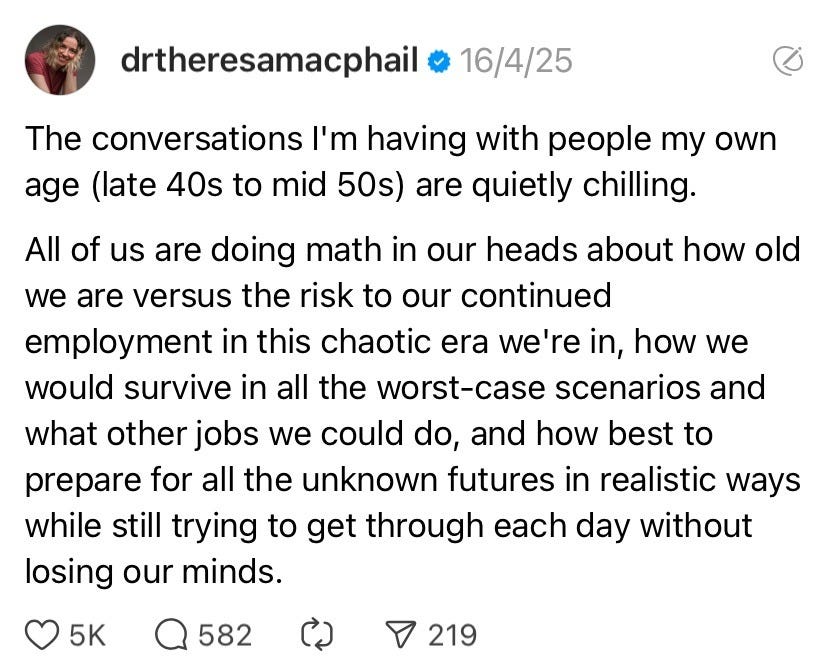




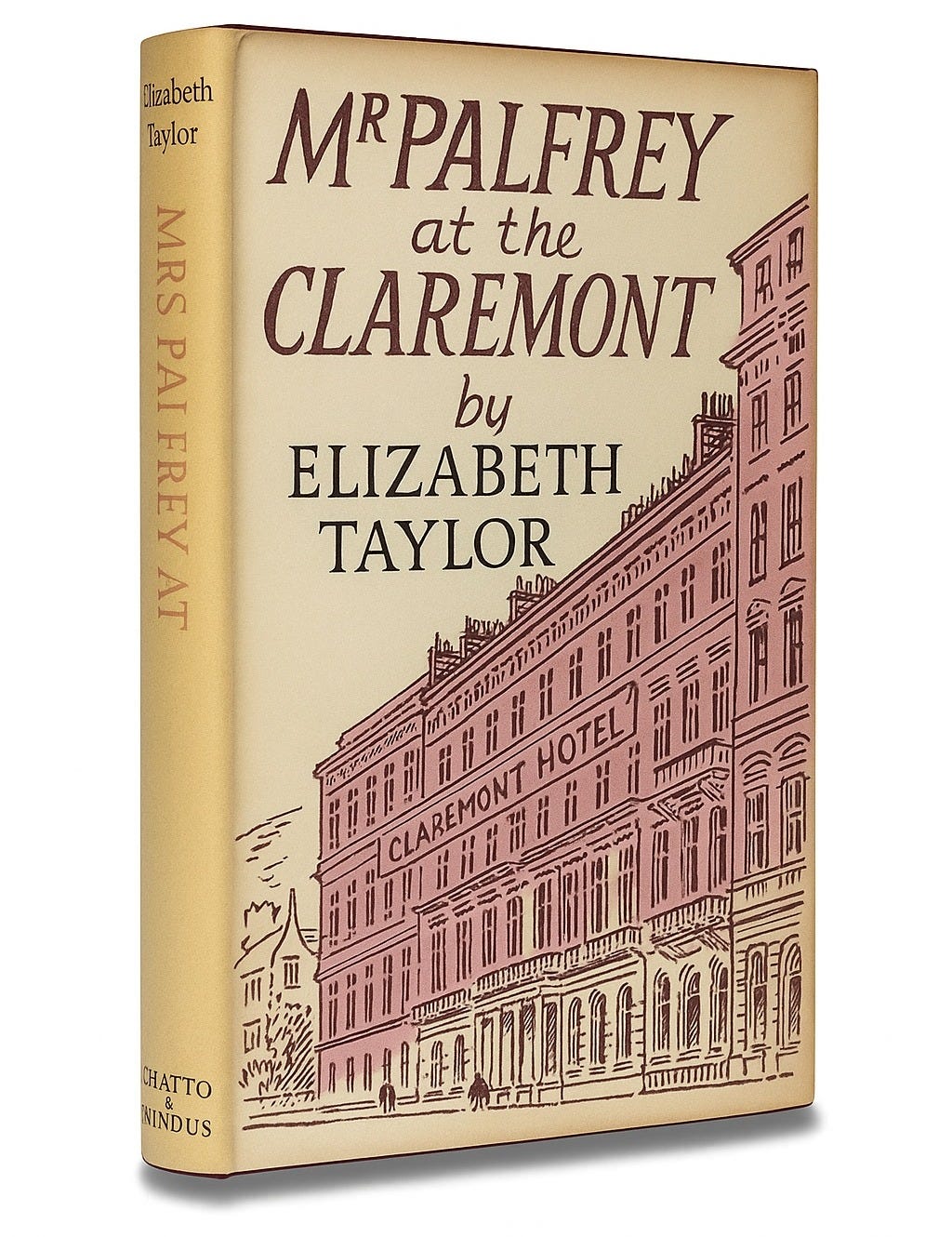





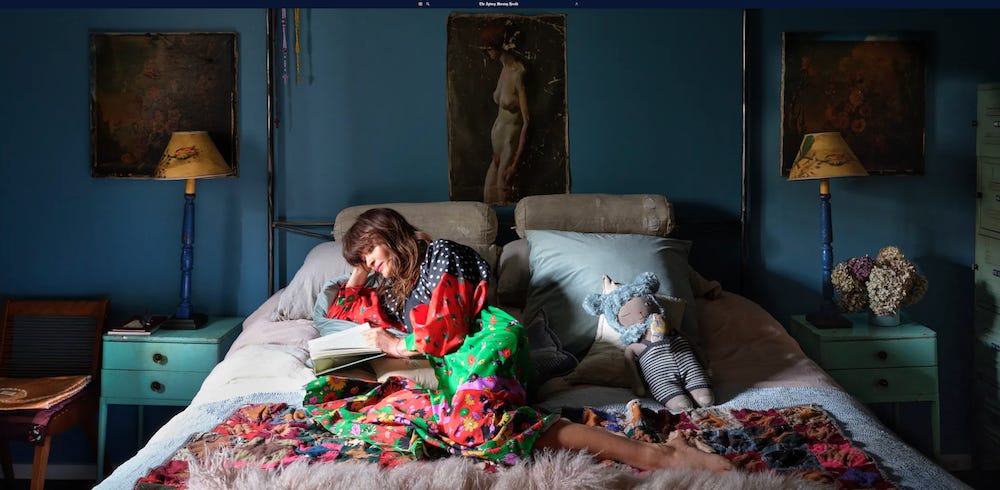
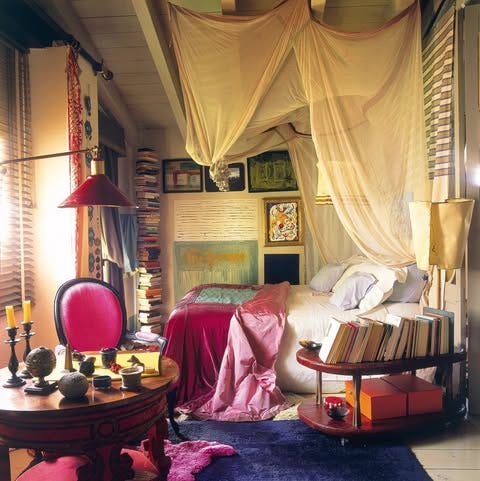

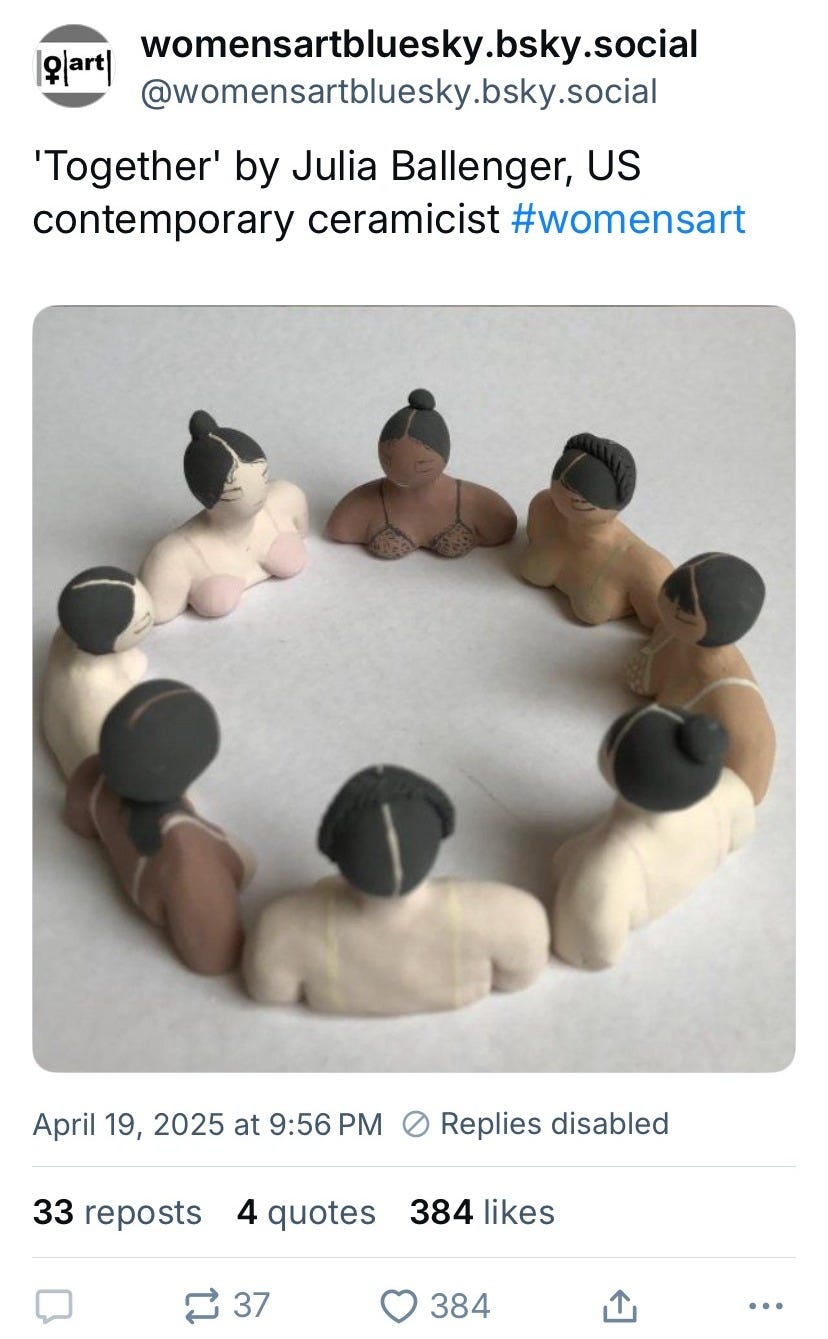


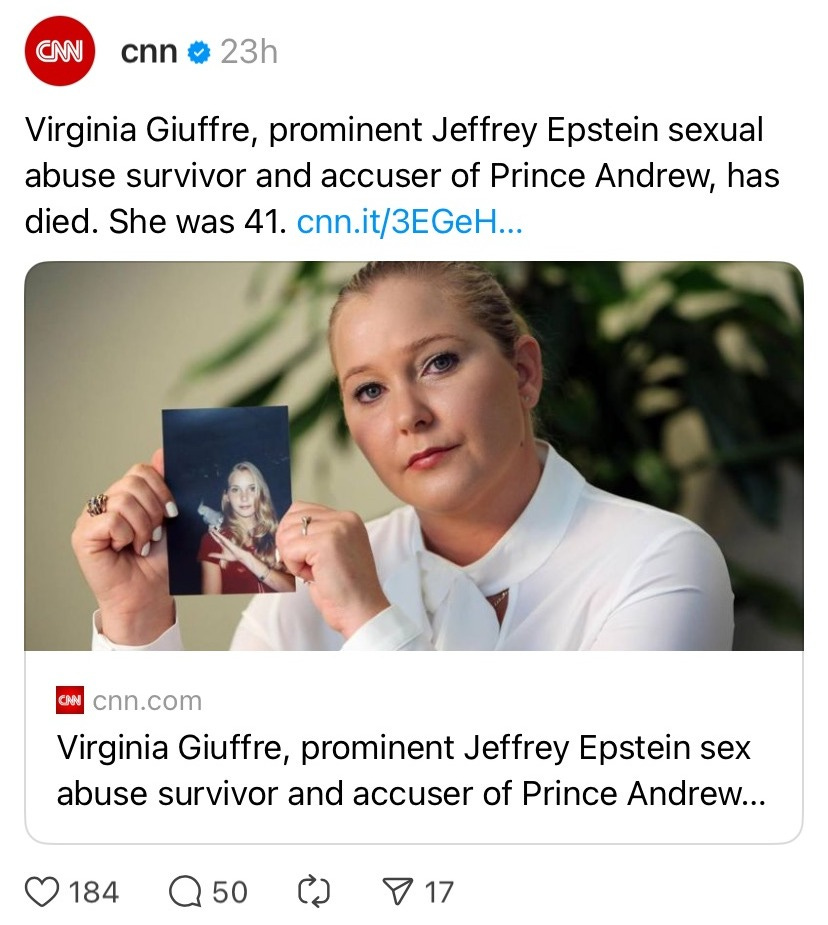
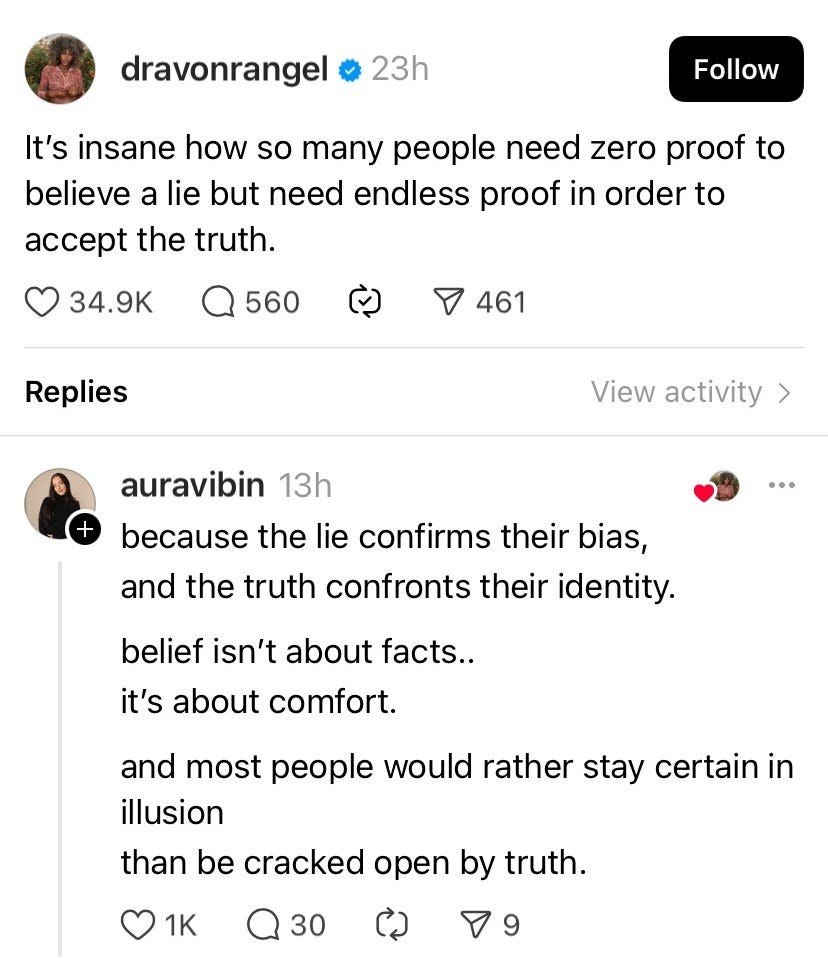
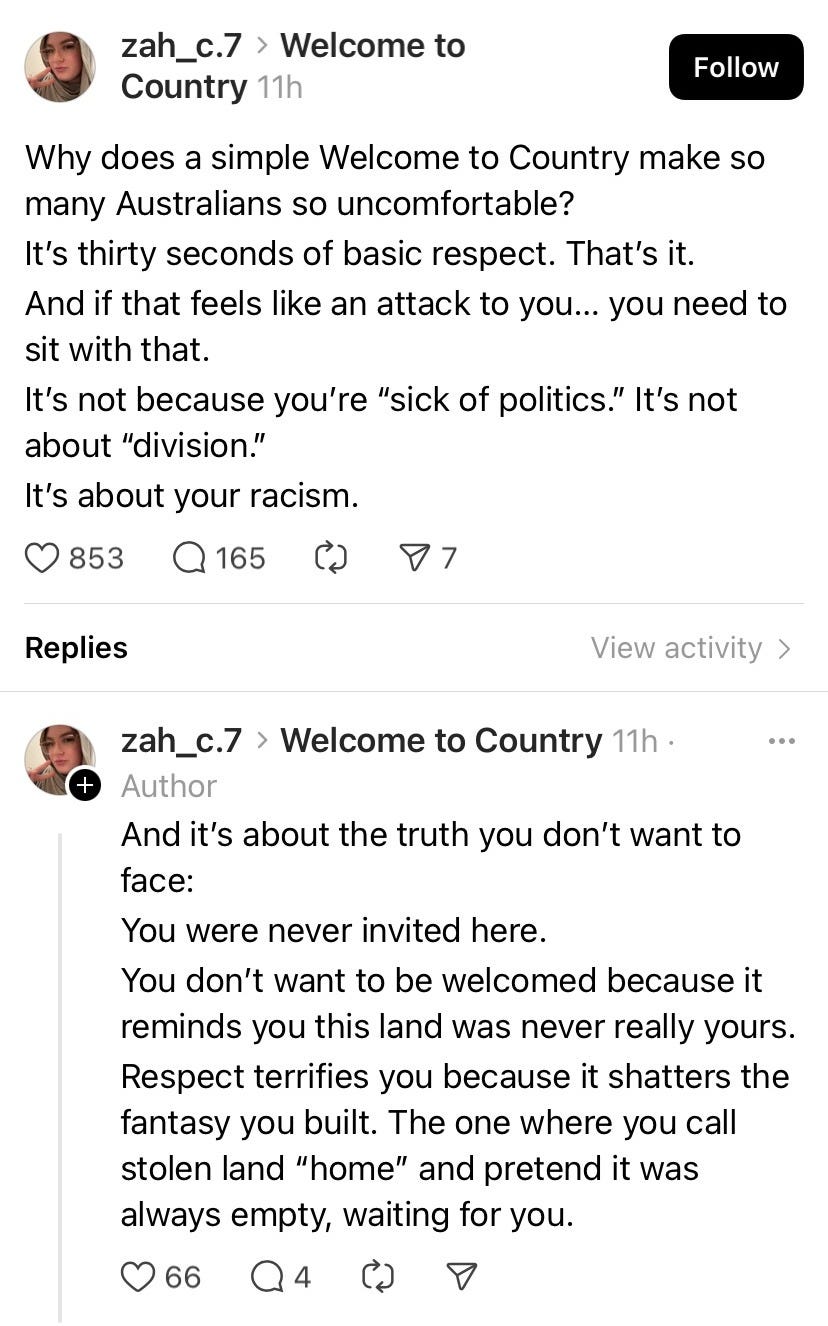
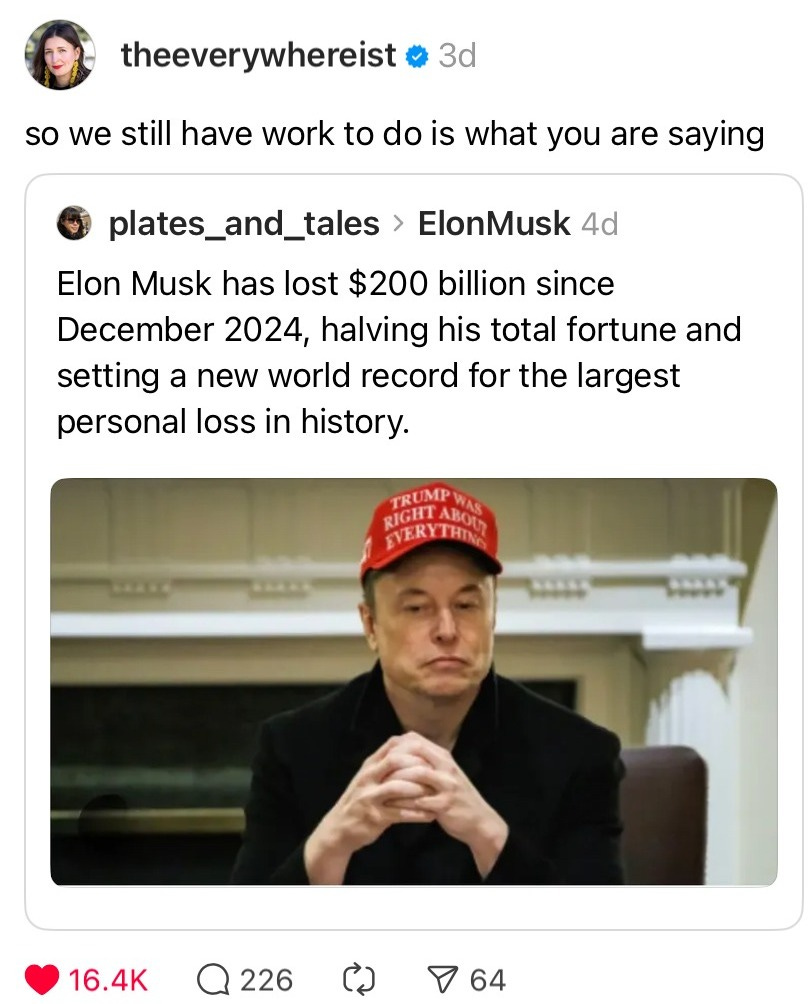
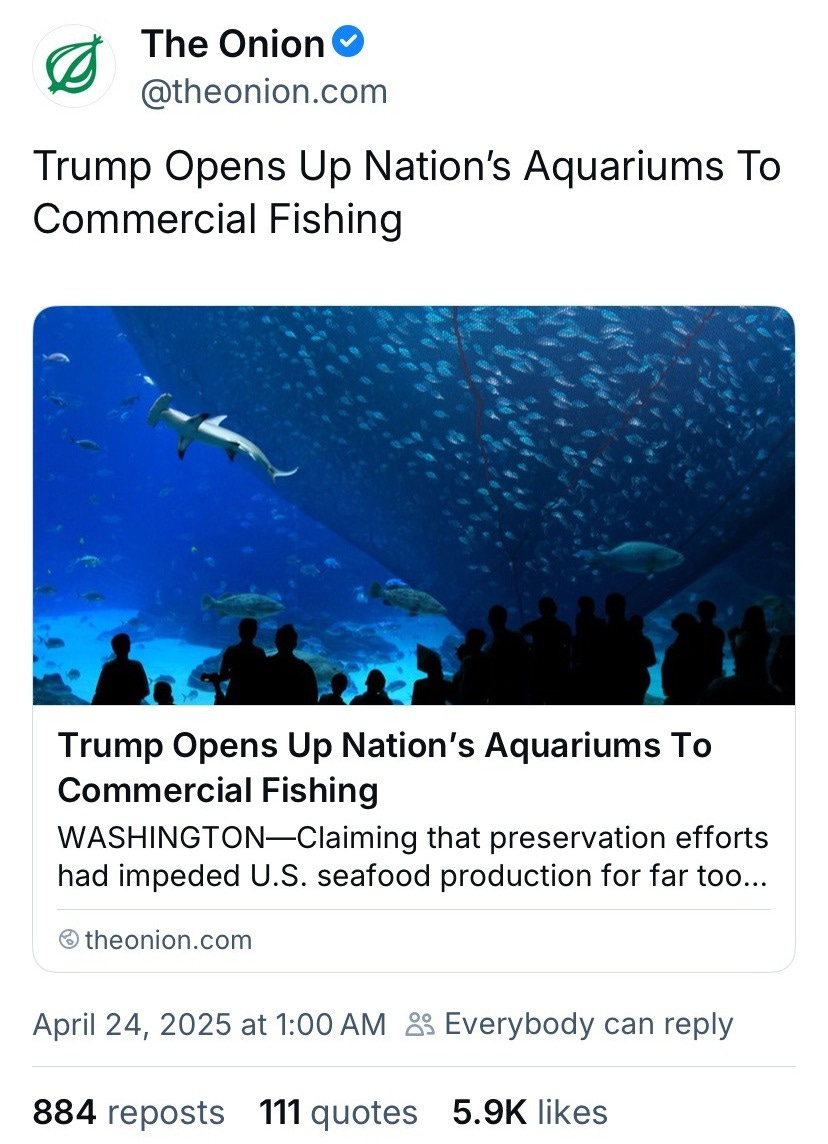

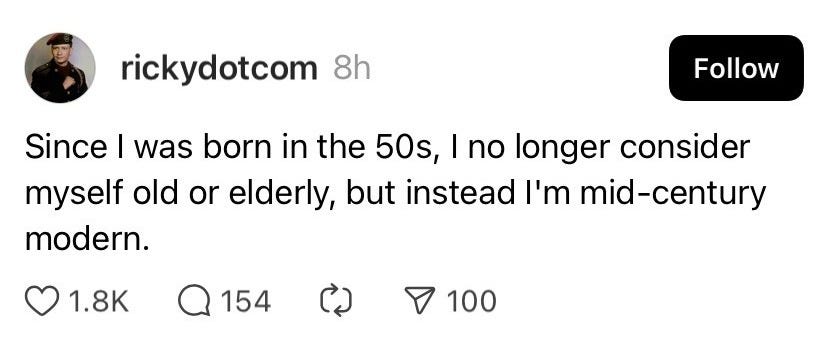
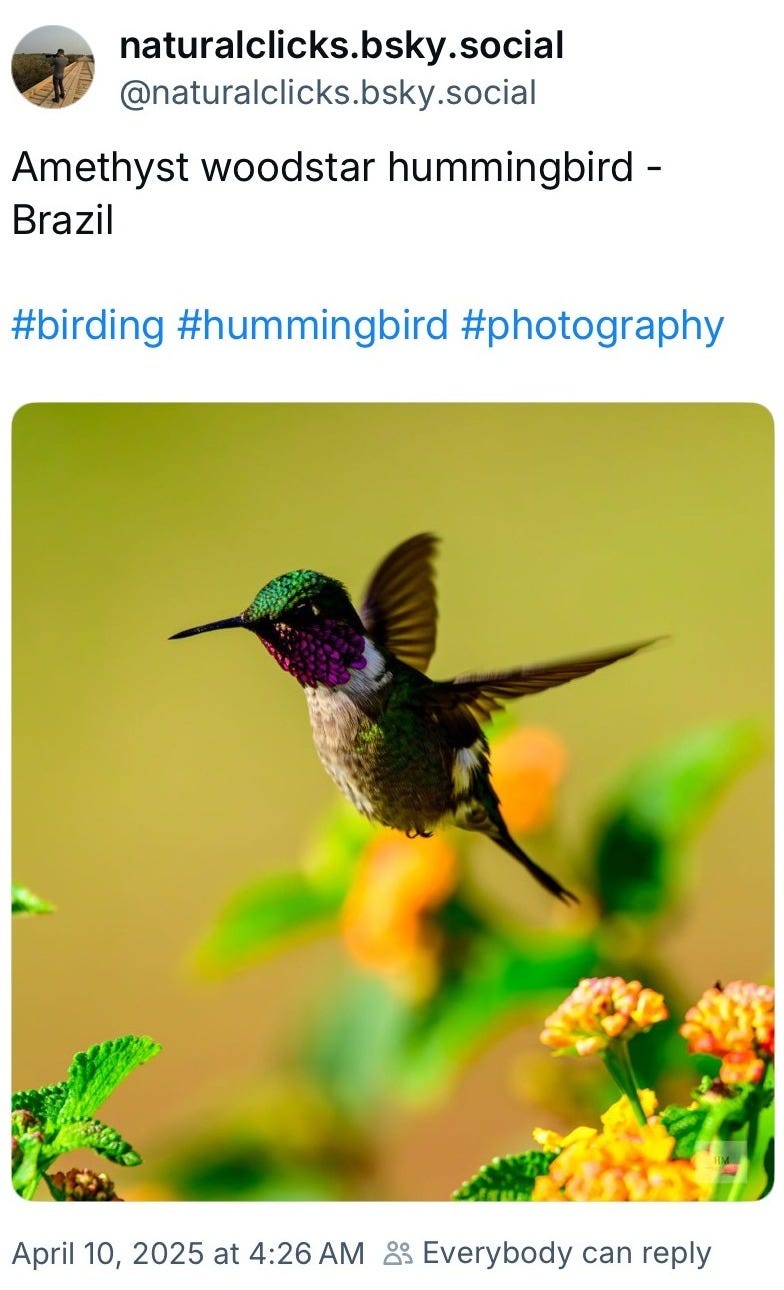



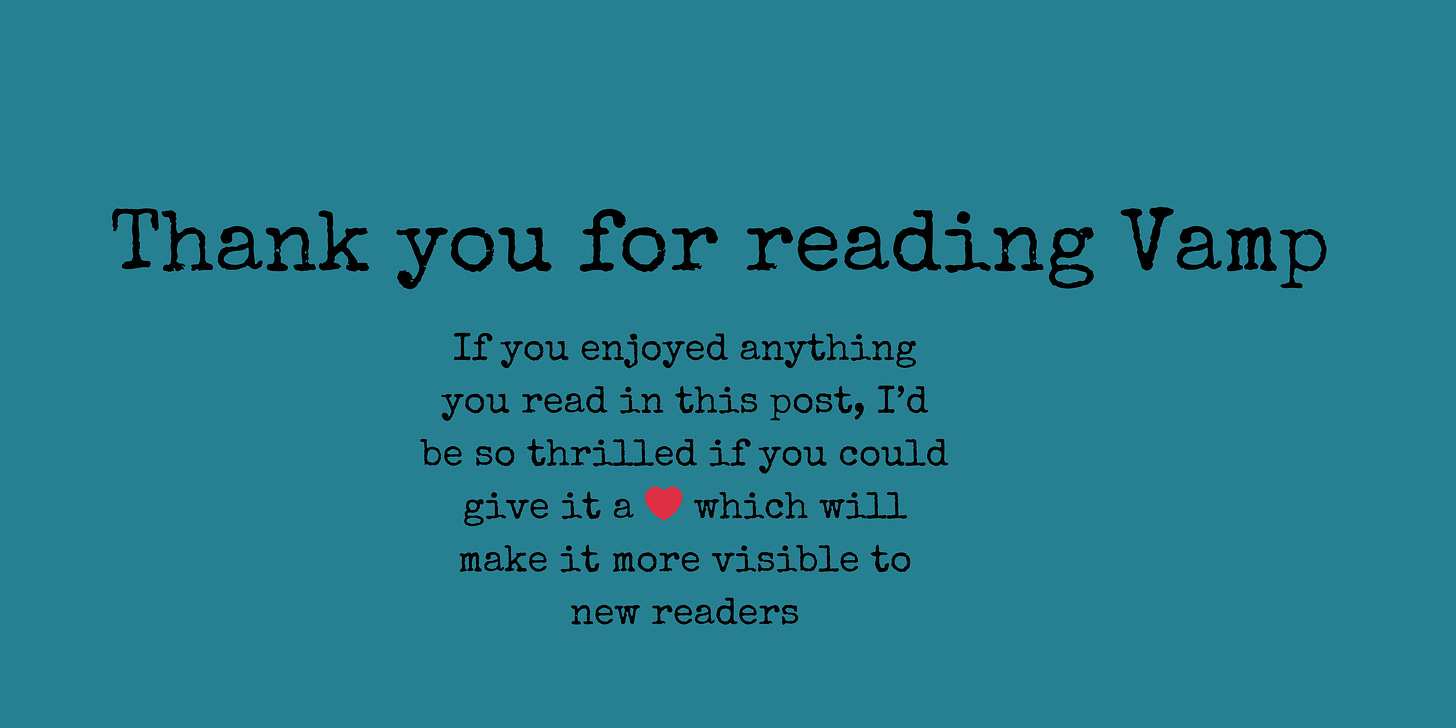
You write so cogently and engagingly, Stephanie. Shrinking relevance? Nope! Your voice is one I want to hear/read! I love that phrase 'I am the 21st century equivalent of an 18th century lace-maker'. An artisan, then!
Good luck with the UK trip!
Oh Stephanie I hear you! I remember you losing that Epicure gig. It was awful for you. I lost my round at The Age as gardening editor when a new editor took over Spectrum and wanted to put a friend in the job! While I was 72 it still hurt. For years! I felt irrelevant as I loved that job but finally started volunteering at an op shop and I am now 75 per cent through my memoir. Journalism is tough these days. But you are such a good writer I can't imagine not seeing your name in print ever again. Go and enjoy your holiday, refresh yourself and come back reinvigorated. Something will come up for you. I feel it in my waters! Denise xx